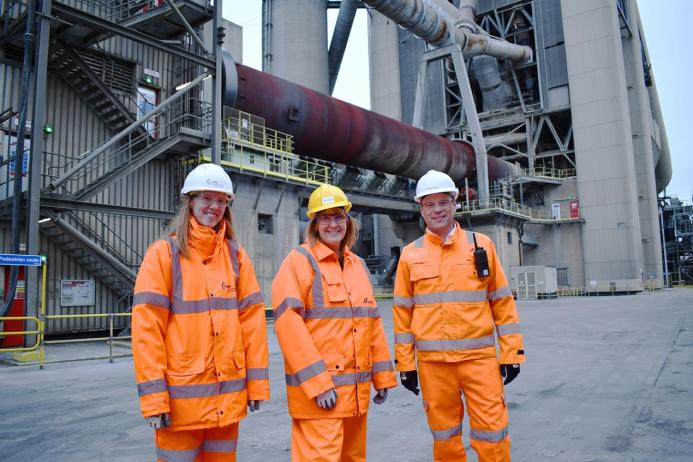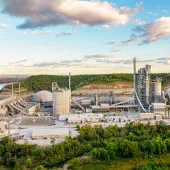UK Minister visits cement works to discuss decarbonization policy
Sarah Jones MP visits Rugby cement plant to talk about barriers and potential policy solutions to decarbonization
THE UK Minister of State for Industry, Sarah Jones MP, visited Cemex’s Rugby cement plant, in Warwickshire, today (Wednesday 11 December) to discuss barriers and potential policy solutions to decarbonize cement production.
Co-hosted with the Mineral Products Association (MPA), which represents UK cement manufacturers, the visit was focused on how the Government can help to provide policy support to the cement sector.
Discussions were wide-ranging, covering cement production within the UK’s established carbon capture clusters, ‘dispersed’ plants like Rugby (that are not within a cluster), and decarbonization opportunities across the wider industry.
Mineral products will be critical to the success of the UK Government targets on house building and renewable energy deployment because they rely heavily on essential materials like cement, concrete, aggregates, asphalt and lime. But, according to the MPA, if key issues facing the sector are not resolved, performance constraints will negatively affect the rest of the economy, including projected high-growth sectors.
Sarah Jones, who is Minister of State at both the Department for Energy Security and Net Zero, and the Department for Business and Trade, said: ‘The UK cement industry is vital for our national infrastructure and provides high-skilled, high-wage jobs across the country, but it is also our fourth-largest carbon-emitting sector.
‘Decarbonizing industry is at the heart of the Government’s plan to achieve net zero while growing the economy – this means working with companies like Cemex, who are leading the way to reduce carbon emissions in the cement sector through their innovative Future in Action programme.’
Dr Diana Casey, the MPA’s executive director for energy and climate change, said: ‘Global cement companies are taking decisions on long-term investments now and the UK needs to attract that investment to ensure we have a secure supply of low-carbon cement to meet the UK’s ambitions for economic growth and decarbonization.
‘The Government has a clear choice – support and grow a low-carbon domestic industry employing thousands of people in highly skilled, well-paid jobs in every region of the country, or rely entirely on higher-carbon imported materials, with a detrimental impact on the UK economy, jobs, and security of supply.’
Lex Russell, MPA chair and managing director of Cemex UK Materials, said: ‘Today’s visit was a welcome opportunity to show the commitment of the UK cement sector to decarbonization, to highlight the challenges the sector faces, particularly around the lack of visibility of policy costs, and discuss the actions required.
‘Net zero is achievable in our industry and it is fantastic to see tangible progress being made on the MPA UK concrete and cement industry’s roadmap to beyond net zero. But government needs to make the right policy decisions to ensure ongoing investment so operators can play their part in realizing a net-zero economy.’
The Minister’s visit allowed the MPA and its members to discuss challenges around competitiveness, investment, and infrastructure, outlining key policy asks, including: A watertight carbon border adjustment mechanism (CBAM); Confirmation of free allocation from 2027 onwards; Visibility of a carbon capture business model that goes beyond the initial Track 1 projects that have been announced; and Commitment to support the Peak Cluster, the world’s largest cement and lime carbon capture and storage project that aims to capture more than 3 million tonnes of carbon dioxide annually.
The Minister and MPA representatives agreed on the need for the Government to keep working together with manufacturers to deliver net-zero carbon emissions by 2050.
Cemex’s Rugby Cement Plant has pioneered the use of alternative fuels, including a multi-million pound investment in 2022 to eliminate fossil fuel use in favour of waste-derived alternatives, a key part of the company’s climate action strategy, Future in Action, aimed at decarbonizing its operations to become a net-zero CO2 company by 2050.










